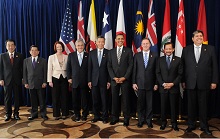Among other things, the TPP seeks to lower trade barriers such as tariffs, establish a common framework for intellectual property, enforce standards for labour law and environmental law, and establish an investor-state dispute settlement mechanism. As of 2011, the agreement's goal had been to "enhance trade and investment among the TPP partner countries, to promote innovation, economic growth and development, and to support the creation and retention of jobs." The United States government has considered the TPP as the companion agreement to the Transatlantic Trade and Investment Partnership (TTIP), a broadly similar agreement between the United States and the European Union.
Historically, the TPP is an expansion of the Trans-Pacific Strategic Economic Partnership Agreement (TPSEP or P4), which was signed by Brunei, Chile, New Zealand, and Singapore in 2005. Beginning in 2008, additional countries joined the discussion for a broader agreement: Australia, Canada, Japan, Malaysia, Mexico, Peru, the United States, and Vietnam, bringing the total number of participating countries in the negotiations to twelve.
Participating nations aimed at completing negotiations in 2012, but contentious issues such as agriculture, intellectual property, and services and investments caused negotiations to continue. They finally reached agreement on 5 October 2015. Implementing the TPP has been one of the trade agenda goals of the Obama administration in the US. On October 5, 2015 Canadian Prime Minister Stephen Harper expected "the full text of the agreement to be released in the next few days, with signatures on the finalized text and deal early in the new year, and ratification over the next two years." Although the text of the treaty had not been made public, Wikileaks has published several leaked documents since 2013.
A number of global health professionals, internet freedom activists, environmentalists, organised labour, advocacy groups, and elected officials have criticised and protested against the treaty, in large part because of the secrecy of negotiations, the agreement's expansive scope, and controversial clauses in drafts leaked to the public.
Members:
|
Country/region |
Status 2005 agreement |
Status TPP |
Start of TPP |
|
Non-party |
Agreement reached |
November 2008 |
|
|
Brunei |
Party (28 May 2006) |
Agreement reached |
February 2008 |
|
Canada |
Non-party |
Agreement reached |
October 2012 |
|
Chile |
Party (8 November 2006) |
Agreement reached |
February 2008 |
|
Colombia |
Non-party |
Announced interest |
January 2010 |
|
Indonesia |
Non-party |
Announced interest |
June 2013 |
|
Japan |
Non-party |
Agreement reached |
May 2013 |
|
Malaysia |
Non-party |
Agreement reached |
October 2010 |
|
Mexico |
Non-party |
Agreement reached |
October 2012 |
|
New Zealand |
Party (12 July 2006) |
Agreement reached |
February 2008 |
|
Peru |
Non-party |
Agreement reached |
November 2008 |
|
Philippines |
Non-party |
Announced interest |
September 2010 |
|
Party (28 May 2006) |
Agreement reached |
February 2008 |
|
|
South Korea |
Non-party |
Announced interest |
November 2013 |
|
Taiwan |
Non-party |
Announced interest |
September 2013 |
|
Thailand |
Non-party |
Announced interest |
November 2012 |
|
United States |
Non-party |
Agreement reached |
February 2008 |
|
Vietnam |
Non-party |
Agreement reached |
November 2008 |
As for Vietnam:
The TPP’s purposes are to unlock opportunities for Vietnam manufacturers, workers, service providers, farmers, and ranchers. We are working hard to ensure that TPP will be a comprehensive deal, providing new and meaningful market access for goods and services; 2 strong and enforceable labor standards and environmental commitments; groundbreaking rules to ensure fair competition between State-owned enterprises and private companies; commitments that will improve transparency and make it easier for small- and medium-sized businesses to export; a robust intellectual property rights framework to promote innovation, while supporting access to innovative and generic medicines; and obligations that will promote an open Internet and a thriving digital economy.
Source: Wikipedia and Office of the United States Trade Representative



 The
The